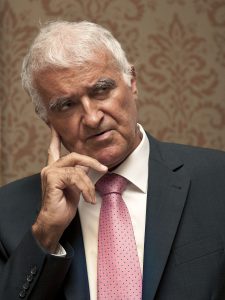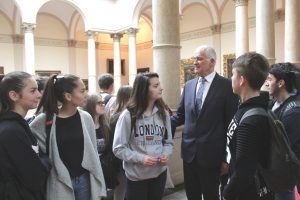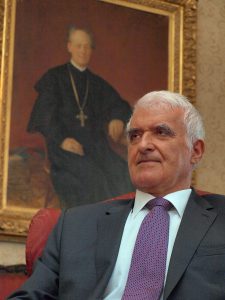When, a century and a half ago, Josip Juraj Strossmayer initiated the founding of the Academy, the guiding idea was that small nations can stand shoulder-to-shoulder with bigger nations with their education, science and culture, that is, occupy the position they are entitled to. Now, we are in a similar position – education, science and knowledge will be one of the most important factors that will determine our position in the European Union and the globalized world, while culture and art will play an important role in preserving national identity and contributing to the European identity – says academic Zvonko Kusić, president of the Croatian Academy of Science and Art, in his interview for Diplomacy & Commerce.

1. What is the quality of the Croatian science today and how capable are Croatian scientists to participate and contribute to the current debates in the Croatian society and beyond?
The vision of the Croatian Academy of Science and Art, as the highest level scientific and artistic institution in Croatia, is that the Croatian society is a society of knowledge and science, and therefore we advocate the inclusion of Croatian science in the European and global scientific trends. Investing in science and education is investing in future, but governments do not immediately see its benefits as they often have to deal with critical situations at hand. What we have here is a vicious circle where the poor society has no means to invest in science and education, which in the long run leads to it being unable to develop and as a result, it remains poor or regresses even further. In the long run, this is certainly unfortunate, and we have to find the right balance, while preventing science, education and culture falling below the level that would jeopardize the development of the whole society in the future. But if money is managed rationally, results and success can be achieved even with smaller amounts. You need to be able to define priority projects and transfer money to them. Today, we live in the culture of spectacle and show business. In order to promote serious things, much more effort should be invested.
2. What do you think of the quality of education and what should the education reform look like in order for the education to be able to deal with the 21st century? Could you briefly explain your view of a comprehensive curricular reform?
The Croatian Academy of Science and Art has expressed its views on the educational reforms in a timely manner and developed guidelines for education strategy, education system, science and technology that are embedded in the Strategy for Education, Science and Technology. Therefore, the Academy supports the need for a general consensus for the continuation of the school reform while fostering a responsible approach to education. In order for the reform to be successful and feasible, it is necessary to have a professional and scientific agreement on the concept, format, content and order of implementation of the comprehensive curricular reform, taking into account other segments from the Strategy for Education, Science and Technology, as well as the appropriate legal framework. We are committed to the significant involvement of Croatian universities and public scientific institutes in the adoption of key documents and in the implementation of the reform, because educating teachers is a fundamental prerequisite for any education reform.
The reform must be in line with Croatia’s needs in order for the country to be more involved with the technologically advanced society, which requires, among other things, continuous improvement of learning in the STEM area. The reform must also take into account all the positive traditions of Croatian education, as well as the Constitution-guaranteed the right for everyone to have equal access to education in accordance with their abilities. The Academy has received the draft national curricula for the subjects of History and Croatian language from the Ministry of Science and Education to be reviewed.

3. What place does culture occupy in today’s Croatia? How many Croatian artists and art communities enjoy respect and are socially relevant?
In today’s globalized world and in Europe, we will solidify our position on the basis of our knowledge and education and retain our identity thanks to our culture and art. Many artists, with many of them being HAZU members, have created the permanent heritage for their nation with their artwork and have contributed to the evolution of the Croatian, and therefore, our common European identity.
4. What position does HAZU occupy in the Croatian society? How would you define the gist of the situation in Croatia in terms of the fields that are in HAZU’s domain and how much can you influence decision-makers in that context?
Through its initiatives, the Croatian Academy of Science and Art has solidified its position as a reference point for clearly articulated and constructive stances based on scientific, professional and ethical principles. The Academy’s voice is heard, and its opinions, cooperation, patronage and support are sought by a growing number institutions. Ministers and other officials often participate in our meetings. The Academy’s opinions from years ago are still heard in the public space. Our points of view, our stances, and our orientation are a guarantee of the society’s stability and have a long-term effect. We cannot expect that this will always directly affect the social life, but we are under the impression that it has been, slowly but surely, penetrating the public arena, although the HAZU should not change itself for the sake of being approved, liked or applauded by other people. This U-turn did not happen suddenly, but it is felt. It’s hard to say what’s causing it. We presume there are three possibilities – one is to do better and more, the other is to be more recognizable, because that is the most important thing in today’s world dominated by media, and the third important thing is that there is the destruction of most institutions, lack of trust in them and relativization of authority in today’s society. The Academy is somehow positioned as a stable institution, the voice of reason and calmness, I would say, and thanks to its authority, continuity, impartiality and independence, it is able to gather the most competent groups and individuals in society. If HAZU were to take sides, it would lose its basic mission as a standard and a reference point. We are demonstrating our important role in predicting situations and providing strategic and scientific support for their solution, but without sensationalist activism and making noise in the media. In developed societies, it is a common practice to first define the goals and on the basis of them, we discuss and draft laws and regulations. In Croatia, it is exactly the opposite and that’s not good. The Academy, therefore, looks at the problems over a longer period of time, while the government has to make decisions on a daily basis. This is why the Croatian Academy directs processes in the society to build a better and more advanced Croatia, which is its main mission.
5. A significant number of young, educated people have been emigrating from Croatia despite the fact that the country is an EU member. What do you think of the consequences of brain drain, and do you believe there is an effective approach that would allow young intellectuals and experts to stay in the country?
The best workforce has always emigrated because they have better conditions abroad to continue their careers and it is impossible to completely stop this. These processes occur in other societies too. In such circumstances, we should work towards securing the best possible conditions for these young scientists and experts to ensure that they stay in the country and to act as a catalyst for the development of the economy and society. Those who have left should be helped to be connected to the Croatian scientific and professional community as much as possible so that Croatia, at least indirectly, benefits from them. It is necessary to create an atmosphere in which apathy and hopelessness will be replaced by social optimism and hope that things in Croatia could be better. This is not an easy task, and therefore is particularly important for those who are society’s leaders and the media to be more optimistic about the future and motivate young people to stay in Croatia and use their knowledge to build up their country instead of moving abroad to secure the basic existence. By doing so, we are going to overcome the economic crisis faster which, in turn, will create a more favourable environment for staying in the country. This is a vicious circle where the departure of the most active segments of the society slows down overcoming the crisis. Young people need to understand that they decide about their lives and that they should not depend on being given something for free or something being taken away from them. That means they will have to continue learning their whole life and adapting to rapid changes. This is not easy, but it is the only way to create a better Croatia. Thus, economic development and keeping young people in the country are connected – one supports the other – and it is important that progress is made. Obviously, we need to sacrifice something in the beginning to initiate this process. People are ready to sacrifice something when they see a goal ahead and believe in it.

6. You are the head of the Council for Dealing with the Consequences of Totalitarian Regimes (of the past) which has recently issued a recommendation on the use of the Ustasha-related salute and the five-pointed red star which were met with strong reactions from the Croatian public, both left and right. What is your view of these reactions and could you explain the Council’s decision? Do you think your recommendations can withstand a test of the current legal framework?
The Council has achieved a great success we could not have foreseen. It has managed to produce a document that is not ideal, but it is realistic, and the critics from both the left and the right are commending the Council because this document will benefit future generations. Communist symbols, that are associated with crimes committed during that era that were often concealed and were not condemned, were deemed controversial for the first time ever. In regard to the Za Dom Spremni salute, the Council took a united stand to allow the use of the salute only in the context of the Crotian Armed Forces (HOS) and the Homeland War (Domovinski Rat). None of the 17 Council members disputed that. The Preamble to the Constitution rejects the NDH (The Independent State of Croatia), but it does mention the Homeland War (Domovinski Rat). These are two constitutional categories, and when they collide with each other it is vital to side with the Homeland War since the HOS (the Croatian Armed Forces) members participated in the Homeland War. These are the people who were killed in defending their country. That was the key element that led to our decision. Now everything is up to the Government! I would also like to commend PM Andrej Plenković because nobody before him dared to do this. This was the step that our country had made. Time will show whether our conclusions were important. Now, legislative bodies need to draft regulation that is more precise, and then it is the judges’ turn. We should not let the judges do their work arbitrarily, as we let them in the past.
7. Which projects and programmes are you going to start implementing by the end of 2018 and what is the framework for their implementation?
The Croatian Academy of Science and Art will appoint new members in 2018. We are going to select up to 16 regular members, and no more than 16 associate members, while up to 8 members will be re-elected. We are also going to select no more than 9 corresponding members. In 2018, we are also going to elect the new president, vice president and secretary general of the Croatian Academy of Sciences, as well as the secretaries of the Academy’s segments and five members of the Presidency for the period 2019-2022. The Croatian Academy will continue to direct processes in the society and significantly contribute to the creation of a new, better and more advanced Croatia, a country of great potential.